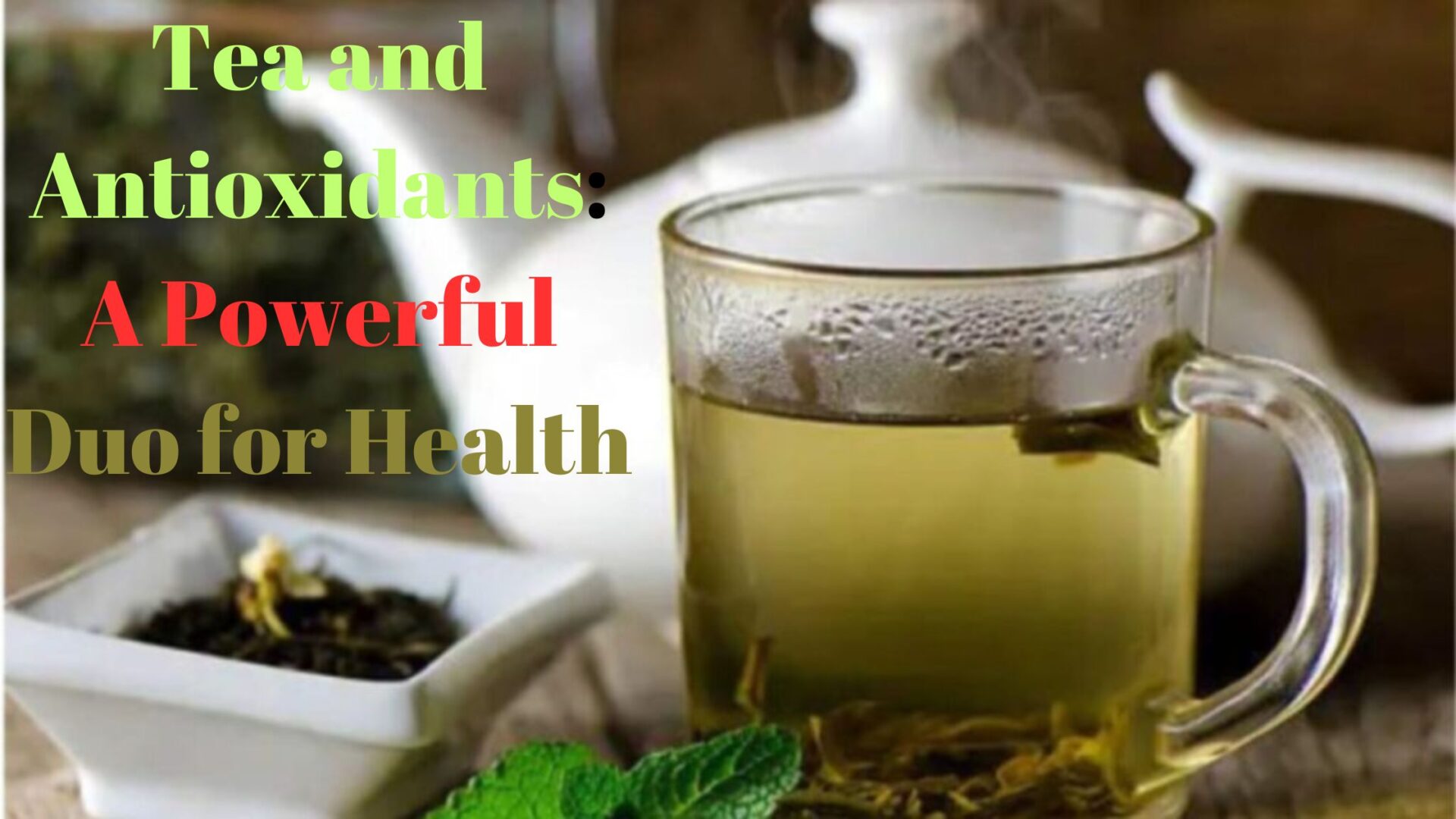Introduction
Tea and Antioxidants: A Powerful Duo for Health

Tea has been cherished for centuries as not only a soothing beverage but also as a source of potential health benefits. One of the key reasons behind its acclaim in the wellness community is its rich antioxidant content. In this article, we will delve deep into the world of tea and antioxidants, exploring how these compounds work together as a powerful duo for promoting overall well-being.
Understanding Tea and Antioxidants
Before we explore the specific antioxidants found in tea, let’s take a moment to understand what antioxidants are and why they are crucial for our health. Antioxidants are molecules that protect our cells from damage caused by harmful molecules called free radicals. These free radicals can be generated by factors such as pollution, UV radiation, and even the natural processes within our bodies. Left unchecked, free radicals can contribute to various health issues, including chronic diseases and aging.
The Antioxidants in Tea
Tea, particularly green tea, is renowned for its high concentration of antioxidants. The key antioxidants found in tea include:
- Catechins: Catechins are a type of flavonoid and a powerful group of antioxidants. Epigallocatechin gallate (EGCG) is the most abundant catechin in tea and is often credited with many of the health benefits associated with tea consumption. EGCG has been linked to improved heart health, reduced inflammation, and even potential cancer-fighting properties.
- Polyphenols: Tea is rich in polyphenolic compounds, which have strong antioxidant properties. These compounds can help neutralize free radicals, protecting cells and DNA from damage.
- Vitamins: Tea, especially black tea, contains vitamins like vitamin C and vitamin E, which are known antioxidants. These vitamins play a role in reducing oxidative stress and bolstering the immune system.
- Minerals: Certain minerals in tea, such as selenium and zinc, act as cofactors for antioxidant enzymes, enhancing the body’s natural defense against free radicals.
The Role of Tea and Antioxidants in Health
- Heart Health: The antioxidants in tea, particularly EGCG and polyphenols, have been linked to a reduced risk of heart disease. They can help lower bad cholesterol levels, improve blood vessel function, and regulate blood pressure.
- Weight Management: Some studies suggest that the combination of caffeine and antioxidants in tea can help boost metabolism and aid in weight management.
- Cancer Prevention: While more research is needed, some evidence indicates that the antioxidants in tea may have a role in preventing certain types of cancer. EGCG, in particular, has been studied for its potential anti-cancer properties.
- Brain Health: Antioxidants in tea may also support brain health. They have been associated with a reduced risk of cognitive decline and conditions like Alzheimer’s disease.
- Skin Health: The skin benefits from the antioxidant properties of tea as well. Topical applications of tea extracts can help protect the skin from UV damage and reduce signs of aging.
How to Incorporate Tea for Maximum Antioxidant Benefits
To harness the full potential of tea and its antioxidants for your health, consider the following tips:
- Choose Quality Tea: Opt for high-quality tea leaves, whether green, black, or herbal, as they tend to have a higher antioxidant content.
- Brew Properly: Follow recommended brewing instructions to ensure you extract the maximum antioxidants from your tea leaves. Typically, brewing for 3-5 minutes at the right temperature is ideal.
- Variety Matters: Don’t limit yourself to just one type of tea. Different teas offer varying antioxidant profiles, so diversify your choices.
- Stay Caffeinated in Moderation: While caffeine can enhance the antioxidant effects, consume it in moderation, especially if you’re sensitive to caffeine.
How tea may affect digestion and whether it can have negative impacts on gut health?
Tea is a widely consumed beverage known for its rich flavors and potential health benefits. While many enjoy tea for its soothing properties, it’s essential to consider its effects on digestion and gut health. In this article, we’ll examine how tea may influence digestion and whether it can have negative impacts on gut health.

How Tea May Affect Digestion
1. Promotes Digestive Health: Some herbal teas, such as ginger and peppermint, have a long history of use for their digestive benefits. These teas contain compounds that can relax the muscles of the digestive tract, alleviate bloating, and help ease indigestion.
2. Hydration: Proper hydration is crucial for healthy digestion, and herbal teas, like chamomile or plain water, can contribute to your daily fluid intake. Adequate hydration supports the smooth movement of food through the digestive system.
3. Antioxidants and Gut Health: Tea, particularly green tea, is rich in antioxidants. These compounds can help reduce inflammation in the gut. Chronic inflammation is often linked to digestive disorders, and consuming antioxidant-rich tea may have a protective effect.
4. Mild Stimulation: Tea, including black and green varieties, contains caffeine. In moderate amounts, caffeine can provide a gentle stimulating effect on the digestive system, potentially aiding regular bowel movements.
Potential Negative Impacts on Gut Health
1. Caffeine Sensitivity: While caffeine can stimulate digestion for some individuals, it may lead to discomfort for those sensitive to it. Excessive caffeine intake can cause increased heart rate, jitters, and even digestive disturbances like acid reflux or stomach upset.
2. Tannins and Iron Absorption: Tea contains tannins, compounds that can interfere with the absorption of non-heme iron (found in plant-based foods). Consuming large amounts of tea with iron-rich meals might reduce iron absorption, potentially leading to iron deficiency in susceptible individuals.
3. Overconsumption and Upset Stomach: Drinking extremely hot tea or excessive amounts of any type of tea can irritate the stomach lining and lead to digestive discomfort, including acid reflux and gastritis.
Balancing Tea Consumption for Digestive Health
To enjoy tea while promoting good digestive health, consider the following tips:
- Moderation is Key: Consume tea in moderation, especially if you have caffeine sensitivity or a history of digestive issues.
- Choose Herbal Teas: Herbal teas like ginger, peppermint, and chamomile are known for their digestive benefits and are generally gentle on the stomach.
- Avoid Excessive Heat: Allow hot tea to cool slightly before drinking to prevent potential irritation of the stomach lining.
- Balance with a Nutrient-Rich Diet: If you’re concerned about iron absorption, ensure your diet includes a variety of iron-rich foods, such as leafy greens, beans, and fortified cereals.
Conclusion
Tea and antioxidants form a potent partnership when it comes to promoting overall health and well-being. The antioxidants in tea, including catechins, polyphenols, vitamins, and minerals, play a pivotal role in protecting our cells from the damaging effects of free radicals. By incorporating tea into your daily routine and making informed choices about the type and brewing method, you can unlock the numerous health benefits this natural elixir has to offer. So, go ahead, savor that cup of tea, and let its antioxidants work their magic for your health.
FAQs
- What are antioxidants? Antioxidants are molecules that help neutralize harmful free radicals in the body, preventing oxidative damage to cells and tissues. They are found in various foods and beverages, including fruits, vegetables, and tea.
- What is tea? Tea is a popular beverage made from the leaves of the Camellia sinensis plant. It is enjoyed worldwide and comes in different varieties such as black, green, white, and oolong tea, each with its unique flavor profile and health benefits.
- How do antioxidants in tea benefit health? Antioxidants in tea, such as catechins and polyphenols, have been linked to numerous health benefits, including reduced risk of chronic diseases like heart disease, cancer, and neurodegenerative disorders. They help combat inflammation, support immune function, and promote overall well-being.
- Which types of tea are highest in antioxidants? Green tea is particularly rich in antioxidants, especially catechins like epigallocatechin gallate (EGCG). However, other types of tea, including black and oolong tea, also contain significant levels of antioxidants, albeit in different compositions.
- How much tea should I drink to reap the antioxidant benefits? There’s no one-size-fits-all answer. However, studies suggest that consuming 2-3 cups of tea per day can provide a significant antioxidant boost and contribute to overall health. It’s essential to balance tea consumption with a varied and balanced diet for optimal benefits.
- Can I get antioxidants from herbal teas? While herbal teas may contain some antioxidants, they generally have lower levels compared to traditional teas made from Camellia sinensis leaves. However, herbal teas can still be a flavorful and hydrating beverage choice with potential health benefits.
- Are there any side effects of consuming tea for its antioxidant content? In general, tea is safe for most people when consumed in moderation. However, excessive intake of tea, particularly caffeinated varieties, may lead to side effects such as insomnia, jitteriness, or stomach upset. Individuals sensitive to caffeine should be mindful of their intake.
References
- “Tea and Health: Studies in Humans.” – https://www.ncbi.nlm.nih.gov/pmc/articles/PMC4055352/
- “Tea: A Gift to the Heart.” – https://www.ncbi.nlm.nih.gov/pmc/articles/PMC3123419/
- “Health benefits of tea: Green versus black.” – https://www.ncbi.nlm.nih.gov/pmc/articles/PMC4055352/
- “Health-promoting effects of green tea.” – https://www.ncbi.nlm.nih.gov/pmc/articles/PMC3401676/
- “Tea and cancer prevention: epidemiological studies.” – https://pubmed.ncbi.nlm.nih.gov/20202171/
- “Tea consumption and risk of type 2 diabetes mellitus: a systematic review and meta-analysis update.” – https://pubmed.ncbi.nlm.nih.gov/28115010/
- “Tea and cardiovascular disease.” – https://pubmed.ncbi.nlm.nih.gov/20879075/






